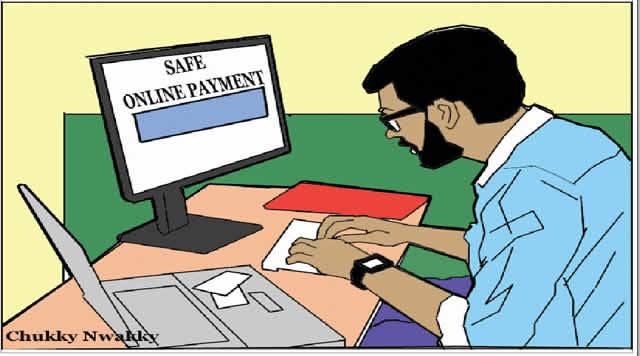
Since the Central Bank of Nigeria started the implementation of the cashless policy, the need for alternative means of payment has been on the rise. As the cash scarcity recedes, it is still quite safer and advisable to transact digitally and operate without the use of cash.
The apex bank stated that the switch to the cashless policy is to mop up excess money in circulation, and curb kidnappings, and armed robbery, among other vices.
According to new industry statistics from the Nigeria Inter-Bank Settlement System released in April, Nigerians used electronic gateways 1.35 billion times in March, which is 448.54 million times more compared to 901.46 million times in February.
The NIBSS recorded cashless transactions from the Nigeria Instant Payment System and Point of Sales terminals. The value of total instant payment in March was N48.33tn while PoS terminals recorded N1.15tn in total transactions in the month.
More Nigerians are depending on mobile devices for transactions as their usage increased by 106.9 per cent month-on-month allowing for a 61.99 per cent increase in transaction value from N2.56tn in February to N4.14tn in March.
The CBN expects this growth to continue and in its Payments Vision 2025 document, the apex bank disclosed that by 2025, the country will have a cashless and efficient electronic payment system infrastructure that will slowly phase out cash transactions.
According to NIBSS, alternative payment options to cash are rapidly gaining popularity in the country. Although the traditional cash-based system has been the most popular amongst Nigerians and businesses, more people are exploring alternative payment options in recent times.
Mobile bank transfers
Mobile bank transfers are perhaps the most popular alternative to cash right now in Nigeria. With these bank transfers, individuals can transfer money or pay bills from their bank account to the recipient’s bank account, online, through mobile banking apps, USSD, or at ATMs. It is a secure and convenient way to make payments without the need for cash. Since 2004, mobile transfers have become increasingly popular.
Although many banks still experience technical glitches since the naira scarcity began, it still remains the most popular alternative for cash payment for different businesses.
Nigeria’s digital currency: e-naira
The e-naira, Nigeria’s digital currency, was launched in October 2021 to enable individuals and businesses to make secure and convenient online transactions. With the e-naira, users can make payments for goods and services, pay bills, transfer funds, and receive payments from customers without the need for cash as it has the same value as the physical naira. The platform uses advanced encryption technologies to protect users’ financial information and transactions. However, the e-naira has experienced little adoption since its rollout.
Online payment platforms
Online payment platforms have also become increasingly popular in Nigeria, with platforms like PayPal, Flutterwave, and Paystack leading the way. These platforms offer a secure payment gateway that enables individuals to make payments using their debit or credit cards or through mobile banking. This option allows gift-givers to send money to the recipient quickly and securely, without the need to visit a bank or retail outlet.
New Quick Response
The New Quick Response payment solution code is one of the most popular digital payment solutions in Nigeria. It is a platform that enables users to make purchases, transfer funds, and pay bills using their mobile phones. The system is secure and efficient, using QR codes to process payments quickly and easily. With NQR, people can scan and pay for items at both physical and online stores, making it an ideal alternative to cash.
Gift cards
Gift cards are a hassle-free and secure alternative to cash payments in Nigeria. They can be purchased from popular retailers and can be redeemed at the retailer’s store or used to purchase items online. Big retail shops like Shoprite offer gift cards to their customers, who then use the gift cards to make payments for purchases. Gift cards can be used to make purchases online, pay utility bills, and carry out other financial transactions.
How to minimise cyberattack via alternative payment channels
While using alternative means to transact, you need to be cautious to avoid a breach of your banking data by cybercriminals.
An anti-money laundering consultant and Managing Director, DataPro Limited, Abimbola Adeseyoju, noted that digital platforms have become increasingly necessary for banks to offer electronic products and services to meet the needs of their widespread and teeming customers across various locations and jurisdictions within and outside the country.
The cybersecurity expert said that though Nigeria is switching to a cashless economy, there were still some setbacks with digital banking platforms and cybercriminals can access banking details.
He stated that bank customers could protect their sensitive banking details by ensuring that they do the following:
Utilise strong and unique passwords
Bank customers should ensure they do not use the same password for all their digital platforms or online activities. They should avoid the usage of a single sign-on password because the demerits are greater than the merits. The risk is huge as a breach or authorised access exposes the bank customer to all digital platforms that are connected to a single password and a hacker can wipe out the whole funds. The passwords should be changed from time to time.
Use multi-factor authentication
Working with the banks, access can be made harder for bad actors or cyber criminals to access your data by adding a second layer of defence. The use of Two-Factor Authentication and/or Three-Factor Authentication – what you know, what you have, and what you are – these factors will harden the information security layers.
Opt for fraud detection
Some triggers and fraud alerts can be sent to the customer which may be agreed with the bank and initiated by the bank’s digital platform based on set rules and scenarios.
Review your statements
You need to review your statements and/or transactions from time to time to take note of irregularities, if any. However, banks should push notifications to your mobile device to alert you if something looks suspicious in your accounts but the customers must keep interacting with the banks.
Don’t use public Wi-Fi hotspots for financial transactions
Don’t conduct any digital banking or financial transactions such as online banking, payments, funds transfers, trading, or shopping when you’re using a public computer in an airport lounge, hotel, or library or when you’re using a public Wi-Fi network, say, at your favourite coffee shop, bar or recreation centre. Cybercriminals usually hibernate around these locations to eavesdrop and spoof sensitive personal and financial data as well as unleash Man-In-The-Middle attacks.
Update your software and back up regularly
Cybercrooks look for vulnerabilities in operating systems or programs/apps. Bank customers should regularly back up their data and secure sensitive information to avoid unauthorised users and access.
Lock your devices, screen and clear your desk
Always ensure that your devices are locked when not in use to protect unauthorised persons or third parties from having access to your sensitive and financial data. Avoid opening attachments and links from unknown sources or spam emails as they are used by cybercriminals to harvest bank customers’ sensitive data.
Don’t share your password or PIN
Do not share your password or PIN with any third party. For instance, do not share your ATM card’s PIN with anyone or do not send your wards, employees, driver, or house help to buy anything with your ATM as some have been defrauded as a result of this bad practice.
Other cyber security measures that can be employed by individuals and banks to prevent cyberattacks
Encrypt your data and create backups
Make sure all your sensitive data is encrypted. Saving your data in normal-text format only makes it easy for hackers to access. Data encryption, on the other hand, limits data access to parties that have the encryption key.
Conduct regular employee training
One of the common ways malicious hackers gain access to your database is through phishing emails sent to your employees.
Keep systems and software updated
Software and system update highly impacts your cybersecurity and digital safety. Cybersecurity threats are becoming more sophisticated, and everyday hackers come up with new ways of accessing data. In addition to software updates, install firewalls.
Use strong passwords
A greater percentage of organisational data breaches result from weak passwords. Hackers don’t need much to gain access to your systems. They only require a little vulnerability, and they’ll exploit it. In relation to password management protocols, ensure the following are in place and duly observed. All passwords should be at least eight characters, should contain alphanumeric characters, shouldn’t contain any personal information, should be unique and never used before, should ideally not have any correctly spelt words, and should be kept safely in an encrypted format.
Assess and monitor your vendors
Chances are that your cybersecurity is highly dependent on third-party vendors, which is why you can’t afford to ignore vendor risk management. Also, ensure to reduce your attack surfaces. Your attack surfaces are the vulnerabilities or entry points that malicious hackers can use to access sensitive data.
Pay close attention to physical security
Most organisational cyber risk management policies focus on the digital aspect of cyber risks and entirely neglect their physical premises.
Furthermore, make sure you create a secure cybersecurity policy because your organisation’s cybersecurity is highly influenced by the policies that you have in place.
Have an appropriate policy on bring-your-own-device
This is now very necessary in relation to work-from-home or work-from-anywhere or also referred to as remote work mode. There should be appropriate information security or cybersecurity management system to address the inherent risks associated with this work mode.
Understand the stressors and risk factors
Identify the cybersecurity risk factors or stressors and apply appropriate mitigating measures to address the risks, threats, and vulnerabilities. In addition, implement Data Protection and Privacy Governance (NDPR, GDPR Compliance). Every individual and institution should be abreast of the rudiments, principles, standards, and best practices in respect of data protection and privacy to ensure adequate protection against data breaches, cybersecurity risks, threats, and vulnerabilities.





